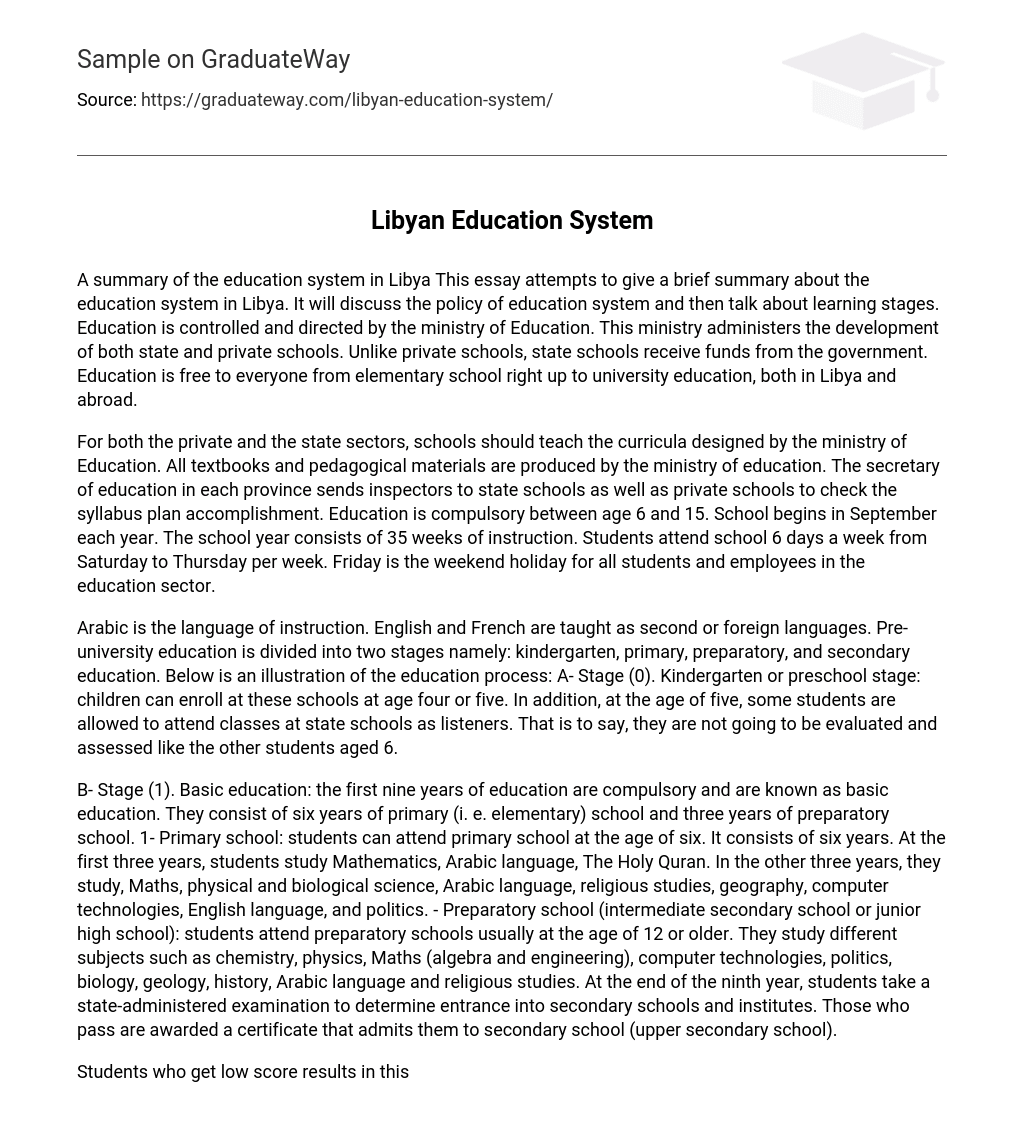A summary of the education system in Libya This essay attempts to give a brief summary about the education system in Libya. It will discuss the policy of education system and then talk about learning stages. Education is controlled and directed by the ministry of Education. This ministry administers the development of both state and private schools. Unlike private schools, state schools receive funds from the government. Education is free to everyone from elementary school right up to university education, both in Libya and abroad.
For both the private and the state sectors, schools should teach the curricula designed by the ministry of Education. All textbooks and pedagogical materials are produced by the ministry of education. The secretary of education in each province sends inspectors to state schools as well as private schools to check the syllabus plan accomplishment. Education is compulsory between age 6 and 15. School begins in September each year. The school year consists of 35 weeks of instruction. Students attend school 6 days a week from Saturday to Thursday per week. Friday is the weekend holiday for all students and employees in the education sector.
Arabic is the language of instruction. English and French are taught as second or foreign languages. Pre-university education is divided into two stages namely: kindergarten, primary, preparatory, and secondary education. Below is an illustration of the education process: A- Stage (0). Kindergarten or preschool stage: children can enroll at these schools at age four or five. In addition, at the age of five, some students are allowed to attend classes at state schools as listeners. That is to say, they are not going to be evaluated and assessed like the other students aged 6.
B- Stage (1). Basic education: the first nine years of education are compulsory and are known as basic education. They consist of six years of primary (i. e. elementary) school and three years of preparatory school. 1- Primary school: students can attend primary school at the age of six. It consists of six years. At the first three years, students study Mathematics, Arabic language, The Holy Quran. In the other three years, they study, Maths, physical and biological science, Arabic language, religious studies, geography, computer technologies, English language, and politics. – Preparatory school (intermediate secondary school or junior high school): students attend preparatory schools usually at the age of 12 or older. They study different subjects such as chemistry, physics, Maths (algebra and engineering), computer technologies, politics, biology, geology, history, Arabic language and religious studies. At the end of the ninth year, students take a state-administered examination to determine entrance into secondary schools and institutes. Those who pass are awarded a certificate that admits them to secondary school (upper secondary school).
Students who get low score results in this exam have no chance to study at state schools. They can whether enroll in a vocational institute or join a military school. C- Stage (2). Intermediate education (secondary school): it extends for three years and it includes specialized secondary schools and technical and vocation centres and institutions. At secondary schools, you cannot join any major unless you get the required score for that major. For example, if you are interested in life science major and your score in Biology and Physics is less than 85 %, you cannot join this specialization.
At the end of the three year study, students must pass state examination to be admitted to universities and other institutions of higher education. This state examination is created and administered by the Secretariat of Education and Scientific Research. Examination results are published in major newspapers as well as on the internet. (Students can also revise their exam papers on the internet). * University Education: It includes universities, higher institutions, and higher technical and vocational centres.
Students apply to universities or any other kind of institution according to their achievement in final state secondary school exam and their major as well. The study lasts four years in most universities. However, it takes seven years for students at the Faculty of Medicine and five years for students at the Faculty of Engineering. The education system has experienced many changes so far. In the last three years, the Libyan government tries to promote the education system in Libya by changing the system of secondary schools





